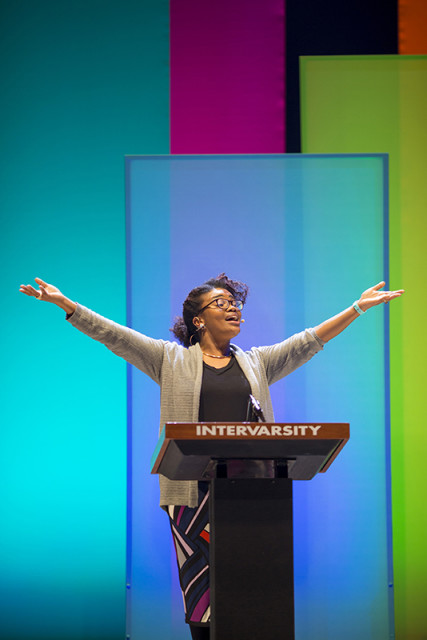
Michelle Higgins has been making waves lately. A leader in the #BlackLivesMatter movement, she recently addressed a gathering of 16,000 evangelical students at an InterVarsity conference in St. Louis, during which she urged them to back the movement. Photo courtesy of Urbana
(RNS) Michelle Higgins has been making waves. A leader in the #BlackLivesMatter movement, she recently addressed a gathering of 16,000 evangelical students at an InterVarsity conference in St. Louis, during which she urged them to support the movement.
Higgins is director of worship and outreach at South City Church in St. Louis and director of the Christian advocacy group Faith for Justice.
RELATED STORY: InterVarsity’s unabashed support for #BlackLivesMatter may be its boldest move yet
Her activism has drawn criticism, with some labeling her “Michelle the Marxist,” and others criticizing her for questioning the assumptions of the anti-abortion movement.
She spoke with RNS recently about her activism. The interview has been edited for length and clarity.
Q: How do you define Black Lives Matter?
A: First and probably most publicly at this point, it is a political ideology. Blacklivesmatter.com is the official recognized political ideology founded by three women of color who are uplifting and affirming that multiple black lives have been ignored and abhorred by our system, and these different types of black lives must be affirmed in whole, holistically, in order for our country to move forward and to be truly a place where freedom rings.
Black Lives Matter is also a decentralized movement, and this is the definition under which you will hear most Christians esteem and support Black Lives Matter. The decentralized movement of Black Lives Matter allows local pastors or local groups to use the phrase to mean all black people are despised systemically in such a way that our country does not hesitate to refuse them proper health care, quality education or fairness in the face of potential arrest. Black Lives Matter as a decentralized movement is overwhelmingly the definition that we are using as people of faith when we say “we support Black Lives Matter.”
Q: Why did you deliver a “black lives matter” message at InterVarsity’s Urbana conference?
A: I believe we are currently in a civil rights era. I do not believe the work of Dr. King is done. And I truly believe that we have gone from holding legislation as the factor that’s going to make everything change, to realizing that politics and legislation cannot be the only tactics that we use. Heart transformation is where it’s at. And because the civil rights movement of the ’60s was peopled overwhelmingly by young high school and college-aged students, I fully believe that the message I brought at Urbana was intended to inspire young people to begin to participate in social justice movements on the shores of North America so that they would be prepared, equipped and sensitive to the overwhelming need for participation in social justice movements around the world.
Q: InterVarsity Christian Fellowship objected to some of your comments on the anti-abortion movement, reiterating that it believes “all lives are sacred — born and unborn.” Can you explain your criticism of the evangelical sanctity-of-life position?
A: If you are black, you wear your pants down on your hips or lower, if you say one curse word or consider for a split second that you might be gay, then you are not worthy of being marked as sacred to God. … This is how many people in the evangelical church view victims.
“If VonDerrit Myers (a black man shot and killed by a St. Louis police officer in October) was wearing an ankle bracelet at the time that he was killed, then he deserved to die.” I’ve heard those words before, from the same people who would protest and get sick to their stomach at the idea that young babies are perishing at the hands of people who are sinful as well. But we are unwilling to give over our framework about the sanctity of life to God. We are unwilling to give over our framework about the worth and the value of nonheterosexuals. We are unwilling to say, “God, you are the judge of who should live and who will die. That belongs to you, and not us.”
(Nicola A. Menzie is a contributor to RNS)




